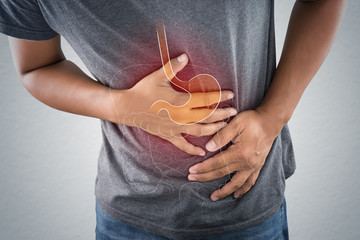Irritable bowel syndrome (IBS) is a widespread gastrointestinal disorder that affects a significant percentage of adults in the United States. Only a sizable percent of whom have received a diagnosis.
You can never anticipate how your gut will respond in a given circumstance. Irritable bowel syndrome (IBS) can be challenging to cope with, mainly when you don’t know how to treat it. Before this occurs, you ought to get yourself prepared by getting the hang of everything about irritable bowel syndrome. This article will give you understandable details on how to cope with irritable bowel syndrome. But first, what is irritable bowel syndrome?
What is Irritable Bowel Syndrome?

IBS is a condition whereby the gastrointestinal tract refuses to work well. It is an intestinal disorder which causes pain in the stomach, gas, diarrhea and constipation.
It affects mostly adults than kids. IBS is much more likely to occur in women than men and usually happens in people aged 45 and below.
It doesn’t really the colon and can be excruciating in severe cases. For the most part, this condition is caused due to the absence of good microscopic organisms in the stomach. Only very few people with IBS usually experience severe signs and symptoms.
Causes of Irritable Bowel Syndrome
Although the specific cause of IBS is not known, some likely factors could lead to IBS. These factors include:
• Infection: IBS could be caused by bacterial infection.
• Muscle contractions: Muscle contractions in the intestine that are stronger and last longer than usual can lead to the symptoms of IBS.
• Reduction in microflora in the gut: Microflora is the “good” bacteria that are present in the intestines and play a key role in your digestive health. When this microflora is reduced, the harmful bacteria will increase and cause IBS.
Signs and Symptoms of Irritable Bowel Syndrome
The abdominal cramping of the stomach is the primary side effect of this condition. Nonetheless, you should note that the symptoms of IBS might be mistaken for symptoms of different, less confounded stomach related problems.
Probably the most interpretive signs and symptoms of irritable bowel syndrome are:
- An overabundance of gas and bloating
- Presence of mucus in the stool
stomach cramps or spasms, - Diarrhea and constipation.
Many people experience less severe effects or a couple of symptoms. In the worst case scenarios of this syndrome, a patient may experience the effects of the considerable number of these signs and symptoms. Much of the time, it causes stomach distress while in extreme cases it can prompt unendurable stomach pain.
Triggers for IBS
Like I mentioned earlier, the exact cause of this issue is obscure. In any case, it has been discovered that items containing caffeine, liquor, and dairy products can trigger the condition. A few foods and drinks may aggravate the issue, as a few people are regularly delicate to wheat, while others are allergic to dairy products. A few people have found that fructose, or, in other words, sugar found in natural products, can trigger this condition.
By maintaining a strategically avoiding these foods and drinks, you can control the indications of irritable bowel syndrome.
Another likely trigger of IBS is stress. Most people with IBS more frequent signs and symptoms during periods where they are stressed out. But while stress may lead to the symptoms, it doesn’t cause them, and it is only a trigger.
Again like I said, women are much more likely to have IBS, which might be due to hormonal changes which play a role. Most women have noticed that the signs and symptoms are worse during or around their menstrual periods.
Treatment of Irritable Bowel Syndrome
There is no treatment accessible that can give a permanent cure to this sickness. You can utilize top-notch IBS medications to soothe the symptoms. Stress reduction and adequate preventive measures are additionally helpful in the treatment of the sickness.
Ongoing research demonstrates that some medical treatments are likewise powerful in treating the syndrome. IBS is a constant sickness that makes a considerable measure of harm the patient’s metabolic system.
How To Cope With Irritable Bowel Syndrome
If you are suffering from IBS, they are a few things you can do to help you cope with it.
1. Change your diet
Since most of the triggers that lead to IBS are foods and drinks, it will be best to change your diet. Avoiding diets that aggravate the symptoms of IBS is an excellent way to start.
To help you regulate the foods in which you should and shouldn’t take, you can create a food diary.
You should avoid foods that trigger the condition such as:
- high-fat foods
- some milk products
- alcoholic drinks
- caffeine
- drinks high in artificial sweeteners
beans, cabbage, and other gas-causing foods
You should try regularly take in fiber-rich foods that are good for your digestive system, such as:
- fruits
- vegetables
- whole grains
- beans.
There are a few hints on the eating regimen for this condition you can actualize to ease your symptoms. Some will work for you, others not.
2. Manage your stress
Stress is another leading trigger of IBS, whether physical or psychological stressors.
To cope with IBS, you need to find and incorporate effective ways to manage stress.
Some simple tips for stress reduction include,
- Getting quality rest and sleep
- Practicing yoga
- Practicing meditation and other relaxation techniques.
If you engage is all these stress reduction tips, you will find out that the symptoms of your IBS have reduced drastically.
3. Exercise
Exercise also helps you to deal with irritable bowel syndrome. Exercising is a healthy activity which is good for the digestive system. It stimulates normal contractions of your intestines. It also helps in reducing stress.
Some good exercise can help the organs in the gutter to function properly. For example there some healthy exercises for the colon.
So there you have it. You now know how to cope with irritable bowel syndrome. Make sure you adhere to the tips and don’t forget to consult your doctor once the symptoms get severe or last longer.








